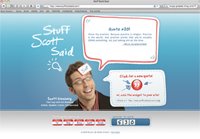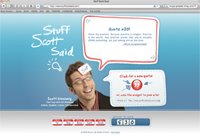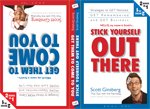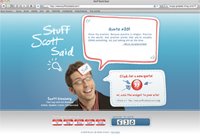 Every speech I give is two speeches:
Every speech I give is two speeches:
(1) The speech my audience thinks they’re getting when they walk in the door, and (2) the speech my audience realizes they got when they walk out the door.
The first speech changes each gig.
Depends on the audience, depends on the venue and depends on the needs of the client.
The second speech rarely changes.
It’s almost always about commitment, consistency and stick-to-itiveness.
Because that’s what my message is ultimately about.
It’s not about sticking a nametag on your chest; it’s about tattooing your commitment to your chest and wearing it proudly, every day.
How do you communicate to the world that you’re fully committed?
Here’s a list of strategies to blow people away with your commitment:1. Take the longcut. Commitment is a constitutional core value. And the capacity to sustain it over a long period of time is not something you’ll learn from a book. Or a weekend seminar. Or a membership website. Or even this blog.
It’s cultivated by surrounding yourself with people who are commitment personified, listening to the music of their lives – then replaying that music over and over until you know every word, every note and every beat by heart.
Then, over time, allowing that music to profoundly penetrate you – down to the core – and making a conscious decision (not a choice, but a decision) that commitment is something you’re going to commit to.
And, that commitment is something that matters to you. Otherwise you’re not committed – you’re just interested. And your efforts to blow people away will be filled with nothing but hot air. Like my friend Kristi writes in Grounded Optimism, “The fastest and most habit-forming route is to make something more meaningful to you.”
Remember: Commitment isn’t something you can game. It takes time. It takes work. And it takes the deepest parts of you. How are you laying a foundation that builds commitment?
2. Don’t make choices without mirroring decisions. My friend Judson lectures to college students about change and choice. During a recent freshman orientation program, he talked about the difference between choices and decisions. Apparently they’re not the same thing.
Finally, after a two-week long, in-depth conversation, Judson inspired me clarify the distinction: The word “decision” comes from the Latin decisio, or “agreement.” Which means it’s a function of values. Which means you gave it serious thought. Which means it’s part your core.
The word “choice” comes from the German kausjan, or “test.” Which means it’s a function of context. Which means you give it minimal thought. Which means it’s an extension of your core.
For example: I made the decision long ago that I would remain in full control of my faculties. As a result, when I’m presented with the choice to do something that violates that decision – like drinking alcohol, for example – self-control is a walk in the park.
Therefore: Decisions are about precedent; choices are about preference. Decisions are made by you; choices are presented to you. Decisions are directions from the heart; choices are selections from the head. And decisions are agreements with yourself; choices are tests of those agreements.
The cool part is: Once you understand this distinction, you’ll begin to make both decisions and choices wisely. And people will be blown away by your commitment. What are you deciding?
3. Be known as someone who owns. Not like, a condo. I’m talking about owning your truth. Living your name. And remaining unwilling to edit yourself to appease the insecurities of others.
That’s what really blows people away: When you communicate to the world that you are fully committed to the person you’ve become. And in this case, to “own it” means to display, embrace it and enjoy it. It also means to participate in the creation of it, to take responsibility for it and to make all the decisions about it.
Even when doing so makes you uncomfortable and/or alienates people. Small price to pay for committing with both feet. Besides, better to be hated for the person you are than loved for the person you’re not. What are you known for owning?
4. Commitment is a coronary condition. I don’t know about you, but my heart is a nuclear reactor. And when I feel its inner alarm reverberating through my bones, not a force in this world can keep me down.
That’s the secret to committing: To stay in tune with your heart. That way, you’ll know when it’s time to press forward. “With great haste and without a moment’s hesitation,” like Goethe suggested.
And while you probably don’t want to recklessly surge forward at top speed, you do want to execute fast enough to scare away the insufficiently committed chumps watching from the sidelines. After all, few things are more powerful than a person ignited entirely by her own instinct.
Come on. Be heartstrong. Say it with your chest. What will be the domain of actions in which you engage?
5. Establish enduring sources of vitality. If you want to blow people away with your commitment, you need to go looking for oxygen. A wellspring of support that energizes and nourishes you.
For example, I practice yoga four days a week. I play music and sing every day of the week. And when I travel, I’m lucky enough to have a girlfriend that fuels me from afar.
What are your sources of vitality? What breathes life into you? After all, vitality comes from the Latin vita, or, life. And when the air gets thin, you’ll need those sources to help you (and your commitments make it out alive).
After all, it’s kind of hard to blow people away with a collapsed lung. At least that’s what my thoracic surgeon told me after he removed my chest tube that one time. What contains the energy you need to catapult you out of this commitment rut?
6. Sustain a deliberate commitment practice. Before he sailed the ocean blue, Columbus had to make a fifteen-year long sales pitch to Ferdinand & Isabella. Can you imagine being that patient? That persistent? There’s a man on a mission of cosmic significance.
If that’s not commitment, I don’t know what is. And if you want to mirror that same level of commitment for the people who matter most, try this: Activate a firm sequence of consistent, similar actions.
Do this, and your life will become a constant demonstration.
Do this, and your commitment will be perceived as unquestionable.
Remember: Consistency isn’t an accident. Sometimes the easiest way to blow people away is to refuse to go away. Will you be the last man to abandon the hill?
7. Be a public spokesperson for your values. The single most powerful personal development exercise I’ve ever done is to write my own Personal Constitution. This is a list of non-negotiable values and decision-making mechanisms. I carry it in my wallet wherever I go.
And while I don’t show it to that many people, simply by virtue of carrying it on my person helps me become a public spokesperson for what matters to me. To write one for yourself, keep a few things in mind:
First, the word “constitution” derives from the Latin constitutio, or, “ordinance.” However, it’s a living document. Which means it’s amenable. And as you grow and develop personally and professionally, various elements of your constitution reserve the right to modify.
Secondly, your constitution is the composition and condition of your character. An established arrangement of your fundamental values governing your behavior. The aggregate of personal characteristics comprising your foundation.
The challenge is sitting down and sorting everything out. But if you’re willing to reflect on yourself (and have a confrontation with yourself) you’ll have no doubt in your mind what you’re committed to and why.
Remember: Commitment requires a clear and rigorous definition. How will you make sure people are clear on what you say you care about?
FINAL WARNING: There’s a difference between unquestionable commitment and petty vindictiveness.
If you plan to blow people away, make sure you’re doing so for the right reasons.
Otherwise the wind is going to bounce back twice as strong.
ULTIMATELY: Those who are committed aren’t just commended – they’re compensated.
LET ME ASK YA THIS…
Are you ready to commit with both feet?
LET ME SUGGEST THIS…
For the list called, “62 Pieces of Advice Busy Executives Need to Know, but Don’t Have Time to Learn on Their Own,” send an email to me, and I’ll send you the list for free!
* * * *
Scott Ginsberg
That Guy with the Nametag
Author, Speaker, Entrepreneur, Mentor
[email protected]
 Who’s quoting YOU?
Who’s quoting YOU?
Check out Scott’s Online Quotation Database for a bite-sized education on branding success!

 A brand without focus is destined to be forgotten.
A brand without focus is destined to be forgotten.
 So, apparently, there’s a mold.
So, apparently, there’s a mold. Occasionally, people will walk up to me and rip off my nametag.
Occasionally, people will walk up to me and rip off my nametag. Who’s quoting YOU?
Who’s quoting YOU? As if you weren’t already assailed with enough negativity, criticism and confrontation from outside sources, I am now going to ask you to start confronting yourself.
As if you weren’t already assailed with enough negativity, criticism and confrontation from outside sources, I am now going to ask you to start confronting yourself. As if you weren’t already assailed with enough negativity, criticism and confrontation from outside sources, I am now going to ask you to start confronting yourself.
As if you weren’t already assailed with enough negativity, criticism and confrontation from outside sources, I am now going to ask you to start confronting yourself. There must be some kind of mistake.
There must be some kind of mistake. Who’s quoting YOU?
Who’s quoting YOU? What do Richard Pryor, Whoopi Goldberg, Lorne Michaels, Lily Tomlin, George Carlin, Bill Cosby and Tina Fey all have in common?
What do Richard Pryor, Whoopi Goldberg, Lorne Michaels, Lily Tomlin, George Carlin, Bill Cosby and Tina Fey all have in common? The world’s FIRST two-in-one, flip-flop book!
The world’s FIRST two-in-one, flip-flop book! Forget about luck.
Forget about luck. Who’s quoting YOU?
Who’s quoting YOU? The purpose of this book is to sell you on my theory of the universe.
The purpose of this book is to sell you on my theory of the universe.  Who’s quoting YOU?
Who’s quoting YOU?